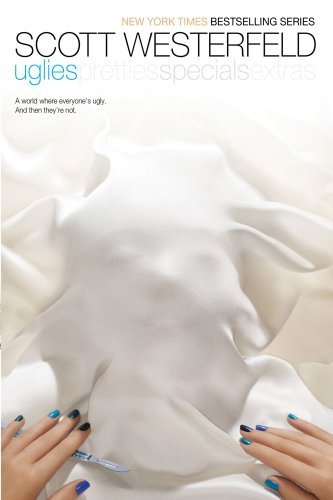 Uglies by Scott Westerfeld is dystopian YA set in a future USA where everyone gets plastic surgery at 16 to make them look a) pretty and b) all very similar. Pre-op teens are called uglies because their, y’know, normal-looking faces and bodies are considered ugly by the very precise beauty standards of the society. Post-ops are known as pretties (with additional qualifiers for age later on). And, of course, uglies and pretties don’t mix. Once children reach age 12, they leave their (pretty) parents’ homes and movie into an dorm with other uglies.
Uglies by Scott Westerfeld is dystopian YA set in a future USA where everyone gets plastic surgery at 16 to make them look a) pretty and b) all very similar. Pre-op teens are called uglies because their, y’know, normal-looking faces and bodies are considered ugly by the very precise beauty standards of the society. Post-ops are known as pretties (with additional qualifiers for age later on). And, of course, uglies and pretties don’t mix. Once children reach age 12, they leave their (pretty) parents’ homes and movie into an dorm with other uglies.
Honestly, when I was reading I couldn’t help picturing pretties as those horrific over-plastic surgeried people. You know, the ones that look alarmingly plastic? So I couldn’t quite see the personal appeal of becoming a pretty, but it was quite plausible that the characters in the book were desperate for it. All the brainwashing at school (“It’s biology! We’re programmed to like pretty people.”) would have helped too. Basically, the society Westerfeld created was plausible and, while I wouldn’t say “only in America” it did seem the sort of thing much more likely to eventuate in the US than, say, Europe or Australia. Just saying.
The main character, Tally, is left alone on the ugly side of the river after her best friend is turned pretty three months before her (since he is three months older). She is desperate to join him. But then she meets Shay, who doesn’t want to become a pretty and who thinks that maybe staying ugly wouldn’t be such a bad thing. Shay knows of a special city/village called the Smoke, where uglies can live happily away from the watching eyes of the city and never have to turn pretty. After they become friends, Shay runs away to the Smoke not long before she’s due to turn pretty. Tally is again left alone but, after an encounter with the scary-looking specials, Tally is forced to follow.
The middle half-ish of Uglies was a bit predictable plot-wise. It wasn’t bad, but it also wasn’t in any way surprising for a dystopian YA novel. On the other hand, the writing was good and the characters and world building were good, which made up for it. The real pay off, however, was the ending which took the story in an interesting new direction and set up the next book in the series. (I don’t know if you can see clearly enough in that cover photo, but the book titles go Uglies, Pretties, Specials, Extras.)
The one thing that bothered me was that it wasn’t as anti-beauty standard as I was hoping. The pretties were creepy and similar-looking and had way more surgery than would be considered healthy in our society (although it’s set in the future and medical science has advanced so that surprisingly complicated surgeries don’t take very long and have very little recovery time associated with them). And yes, the book does carry the message that you can be beautiful just the way you are (as you would hope it would!). However, I thought this was undermined a bit when it was revealed that the society was creepier and more controlling than it appeared on the surface. I know this is de rigueur for dystopias, but it still felt like it detracted from the “you don’t need plastic surgery to look normal” message.
I definitely want to read the rest of the series, but it may be some time before I get to it, thanks to a self-imposed book-buying ban. I recommend Uglies to anyone who likes YA, dystopias or science fiction.
4 / 5 stars

No comments:
Post a Comment
Note: only a member of this blog may post a comment.